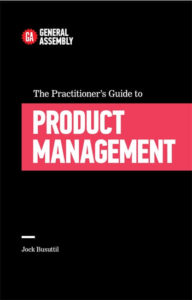
PRODUCTHEAD: Dealing with discomfort
PRODUCTHEAD is a regular newsletter of product management goodness,
curated by Jock Busuttil.
exit music (for a product manager)
tl;dr
Firing someone is a task you will always perform with some discomfort, but you still need to be able to do it well
At Netflix, it’s not enough to be a hard worker achieving only B-grade results
Founder of AngelList Naval Ravikant seeks happiness by trying to live in the here-and-now, neither obsessing about the past nor fantasising about the future
If your team’s cultural norms cause you to feel uncomfortable, ask yourself why you think it’s not ok
a favour: please share this with other product people
every PRODUCTHEAD edition is online for you to refer back to
hello
Certain things about being a product leader will make you uncomfortable. Whether it’s having a conversation with a difficult stakeholder, or making what you feel is a compromise too far, there’s always going to be something that gets under your skin.
Debugging your discomfort
Whenever I notice myself feeling uncomfortable about something, I try to pause and interrogate myself about why I’m feeling that way, what triggered me, and try and restore a sense of objectivity to it.
In my own case, I will readily admit that some of the reasons I feel a particular way about something can be deep-rooted and very private, but by at least calling them out to myself, I can ‘debug’ an otherwise general feeling of discomfort. I’m by no means perfect at this, but it helps to acknowledge it to myself.
This idea of debugging one’s own thoughts reminded me of a long but engaging podcast episode from The Knowledge Project — a conversation with Naval Ravikant, co-founder and former CEO of AngelList.
Some people can’t be fixed
If you’ve managed other people directly, you’ll probably know how much effort and attention it can take to coach round someone who’s struggling in their role — I certainly have.
We’re not talking about a minor blip in behaviour here. This was a chronic failure to escape the damaging patterns of behaviour that were preventing them from being effective. Their under-performance had cost them their credibility with stakeholders, only making it harder for them to operate effectively as a product manager. It was a truly vicious circle.
The real kicker was that they recognised they were struggling, but they couldn’t break out of their loop, no matter how much time we spent together in coaching and support sessions.
I felt like I’d expended blood, sweat and tears to try to ‘fix’ them to no avail, when really (at least in my case) I was just avoiding having to make a difficult call to fire them.
Was I making it about me?
Circling back to what makes me feel uncomfortable, I was happy to do almost anything to avoid the feeling of ‘giving up’ on someone, and the discomfort of a difficult conversation to fire someone.
In retrospect, it was clear they weren’t happy in their role. For me to prolong that situation wasn’t in their best interests. They could be much happier working elsewhere without having to take their associated emotional and political baggage with them.
The Harvard Business Review article I’ve included this week about firing people with compassion dredged up some memories of discomfort for me, but broadly I agree with its points. It serves as a helpful counterpoint to the mass sacking by Zoom call that CEO of Better.com Vishal Garg perpetrated in December 2021.
Also I felt it was worth revisiting the Netflix HR presentation about their reasoning behind how they manage and retain talent (or at least how they did in 2014).
After all that, I need another cup of tea.
Have a good week, and speak to you soon,
Jock
what to think about this week
How to fire someone with compassion
The author, chairman of JetBlue and an adjunct professor at Stanford, has fired plenty of people during his long career—and he’s been fired himself. In this article he outlines an empathetic approach in which the manager recognizes that he or she played a role in the employee’s failure to perform—and that this difficult conversation, which should not be outsourced to the HR department, is something a manager should strive to handle well.
[JOEL PETERSON / HARVARD BUSINESS REVIEW]
How Netflix reinvented HR
When Netflix executives wrote a PowerPoint deck about the organization’s talent management strategies, the document went viral—it’s been viewed more than 5 million times on the web. Now one of those executives, the company’s longtime chief talent officer, goes beyond the bullet points to paint a detailed picture of how Netflix attracts, retains, and manages stellar employees.
The slide deck referred to in the article: Netflix Culture: Freedom & Responsibility
[PATTY MCCORD / HARVARD BUSINESS REVIEW]
Naval Ravikant: The Angel Philosopher
Naval Ravikant is the CEO and co-founder of AngelList. He’s invested in more than 100 companies, including Uber, Twitter, Yammer, and many others.
It’s difficult to nail down exactly what we discuss in our conversation because I had so many questions to ask him. Naval is an incredibly deep thinker who challenges the status quo on so many things. This is an interview you’ll want to listen to, think a bit, and then listen to again.
How to overcome destructive habits (and much more)
[SHANE PARRISH / THE KNOWLEDGE PROJECT]
Many things are ok (and that’s ok)
This whole thing is a valuable learning exercise for leaders, for one important reason: if you do trust your team to write this for you, and then react with horror at one of the things they have said should be ok, you should take the chance to ask yourself: “Why am I horrified? Why don’t I want this thing to be ok? What’s stopping me?” You might end up going into deep rabbit holes from here, but they’re good rabbit holes.
[GILES TURNBULL]
recent posts
Should a growth product manager even be a thing?
There’s an ongoing debate about generalist product managers versus emerging product manager specialisms (such as ‘growth product manager’). I think there is room in our profession for both. Let me explain.
“No one wants to get rich slow”
[I MANAGE PRODUCTS]
6 tips for presenting slides that don’t suck
This is an updated version of an article I wrote over a decade ago.
All product managers will need to stand up and present to others at some point. Some people are less comfortable giving a presentation than others; that’s natural. Either way, you won’t be helping yourself (or your audience) if your slide deck is atrocious. So here are my 6 tips for presenting slides that don’t suck.
[I MANAGE PRODUCTS]
My boss wants to set me an OKR on revenue growth. Is this right?
My boss wants to set me a personal OKR [objective and key result] to achieve revenue growth through demonstrable product improvements.
Can you think of any reasons why I should push back on a suggestion like this?
G
Revenue is a rubbish choice of metric
[I MANAGE PRODUCTS]
upcoming talks and events
10th March 2022
Product Ops Summit

The product ops party is back – and you’re invited 🎉
The third instalment of the Product Operations Summit has landed, so join us on March 10 to celebrate the unsung heroes of product management. 🏆
On the mic, we have:
🎙 Product Ops Specialist – Farfetch
🎙 Product Ops Lead – OLX Motors Europe
🎙 Global Head of Product – Shipstation
🎙 Head of Product Ops- Amplitude
🎙 Product Ops Manager – Auctane
🎙 Product Ops Lead – Sana Benefits
🎙 Product Ops Manager – Segment
🎙 CEO – Dragonboat
…plus loads more to come.
Get ready for juicy tips, tricks & insights from those pioneering product ops. 🤩
PRODUCTHEAD subscribers get 20% off an Access All Areas pass, just use PROD20 at checkout 💸
Grab your pass 👉
can we help you?
Product People is a product management services company. We can help you through consultancy, training and coaching. Just contact us if you need our help!
Helping people build better products, more successfully, since 2012.
PRODUCTHEAD is a newsletter for product people of all varieties, and is lovingly crafted from the political fallout of a birthday party during national lockdown.


Leave a Reply